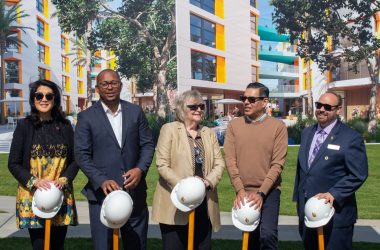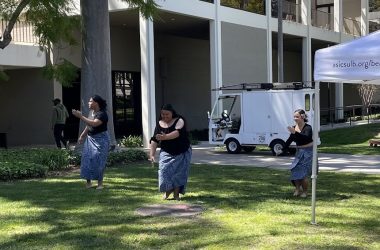Bob Marley said it best – “Africa, unite! ’cause were moving out of Babylon…”
After the liberation of many African colonies, leaders and political figures from across the continent found it in the collective interest to create an African Union to promote unity and prosperity throughout all the different countries and cultures of Africa.
At Cal State Long Beach, the Africana studies department hosted an open forum this Wednesday, called “The African Union Vision: Balancing the Past and Present.” The panel discussion was at the Karl Anatol Center from 11 a.m. to 1 p.m.
The panel participants included professors Alosi Moloi, Maulana Karenga, Uche Ugwueze and Skyne Uku-Wertimer, who also coordinated the event.
“We can’t do every [event] we want to do during Black History month, so this panel allows us to talk about other important issues throughout the semester,” Uku-Wertimer said.
The topics discussed focused on a broad range of ideas that are all interconnected to the concept of the African Union.
During many years of imperialistic control on the African continent and the unjust plight of the African Diaspora, many countries in Africa struggled for independence according to Uku-Wertimer.
“It was not until the early 1960s during annus mirabilis or ‘The Years of Wonder’ were many African countries gained independence,” she said.
That was when many of the liberated countries created the Organization of African Unity (OAU) to organize their social, political and economic corporations for the benefit of all.
In 2002, the OAU turned into the African Union (AU) to become the new face and mouthpiece of Africa. The AU strives to promote solidarity, unity and to rid the remaining vestiges of colonialism.
The AU has 53 members with their headquarters in Addis Ababa, Ethiopia, which is one of the oldest independent African countries.
Historically colonialism has not treated Africa well. In many of these countries the European colonizer has exploited and raped the land for European benefits, according to Moloi. Cultures, languages, stories of a collective people lost.
“Globalization has kept Africa ignorant, dependent and economically weak, obviously we’re going to fail,” Moloi said. “That’s why Pan-Africanism is strong and why we must preserve the African people and we must tell a collective story,”
While colonialism tried to erase the African culture, language and arts, the AU promotes the regeneration and discovery of arts, science and technology through the African Renaissance. Bright scholars and artists are needed to lay a foundation full of history, rich traditions and culture, Karenga said. This African Renaissance is the flowering of arts and creativity.
“We must regain our internal strength that requires recovery and reconstruction to reengage our own [people], we exist in a borrowed space which falsifies our history, our culture can’t be cut off, we must imagine a whole new way to speak our culture and make our own contribution, ” Karenga said.
The present education system in Africa is structured along colonial lines. With borrowed ideas and structure from Europe, the AU works to restore African education by restoring native African languages. Children hold the future of this African culture but the educational system is still very Eurocentric, Ugwueze said.
“We need to claim our own, and build our own institutions for African people, education blueprints for Africa must come from Africa,” Ugwueze said.
“We want to reach to all students about this continent,” Uku-Wertimer said. “Africa plays an important role in the world arena, what most people think of Africa is poverty but there’s more to African than hunger, we want more students to know the yin yang balance.”
Katrina Eleby, a junior international studies major, reflected on the AU goals.
“It was very insightful about what they’re trying to do,” she said. “I especially agree with incorporating the native language in elementary school so children have this duality, you need these roots or else you’ll be lost.”
Senior child development major Patrice Collins said the forum inspired her.
“I saw all the flyers up and had a lot of classes with most of these professors,” Collins said. “What really stuck to me was when Ugwueze was talking about educating children at a young age about the realities of AIDS and malaria in Africa.”
As the panel comes to an end Karenga shares some of his last ideas.
“We have to learn about each other so we can relate in the most positive mutual respectful, mutual beneficial ways, these forums assist in this to enrich and expand campus discourse,” he said.



